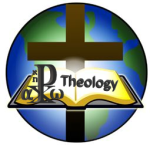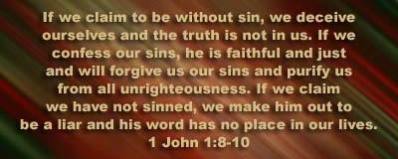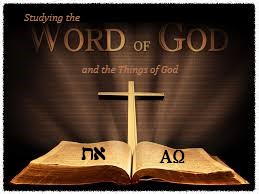Psalm 51
1 To the Chief Musician. A Psalm of David when Nathan the prophet went to him, after he had gone in to Bathsheba. Have mercy upon me, O God, According to Your lovingkindness; According to the multitude of Your tender mercies, Blot out my transgressions. 2 Wash me thoroughly from my iniquity, And cleanse me from my sin. 3 For I acknowledge my transgressions, And my sin is always before me. 4 Against You, You only, have I sinned, And done this evil in Your sight — That You may be found just when You speak, And blameless when You judge. 5 Behold, I was brought forth in iniquity, And in sin my mother conceived me. 6 Behold, You desire truth in the inward parts, And in the hidden part You will make me to know wisdom. 7 Purge me with hyssop, and I shall be clean; Wash me, and I shall be whiter than snow. 8 Make me hear joy and gladness, That the bones You have broken may rejoice. 9 Hide Your face from my sins, And blot out all my iniquities. 10 Create in me a clean heart, O God, And renew a steadfast spirit within me. 11 Do not cast me away from Your presence, And do not take Your Holy Spirit from me. 12 Restore to me the joy of Your salvation, And uphold me by Your generous Spirit. 13 Then I will teach transgressors Your ways, And sinners shall be converted to You. 14 Deliver me from the guilt of bloodshed, O God, The God of my salvation, And my tongue shall sing aloud of Your righteousness. 15 O Lord, open my lips, And my mouth shall show forth Your praise. 16 For You do not desire sacrifice, or else I would give it; You do not delight in burnt offering. 17 The sacrifices of God are a broken spirit, A broken and a contrite heart — These, O God, You will not despise. 18 Do good in Your good pleasure to Zion; Build the walls of Jerusalem. 19 Then You shall be pleased with the sacrifices of righteousness, With burnt offering and whole burnt offering; Then they shall offer bulls on Your altar. (NKJ)
King David, confro nted by Nathan the prophet, confessed his sin. He did not try to excuse himself, nor did he play the victim “card.” When confronted with God’s righteous judgement, with God’s Holy Word, David confessed that what God declares is true.
nted by Nathan the prophet, confessed his sin. He did not try to excuse himself, nor did he play the victim “card.” When confronted with God’s righteous judgement, with God’s Holy Word, David confessed that what God declares is true.
And what sin had King David committed, with the consequence that God called him a sinner and one deserving of God’s condemnation? God had blessed King David greatly. God gave victory over his enemies. He made him King of Israel and gave him to rule the kingdom of Israel. But even with God’s blessing upon him, King David sinned by committing adultery with Bathsheba, the wife of Uriah the Hittite. However, David’s sin didn’t stop there. David also, to cover up his infidelity and Bathsheba’s pregnancy, had Uriah killed in battle by placing him on the front-line, as it were, knowing full-well that Uriah’s life would be taken from him.
David sinned against his neighbor, first by his adulterous affair, the 6th Commandment, then, by committing murder, the 5th Commandment. But his sin encompassed much more than the external acts, a truth to which no less than Jesus Himself testifies:
Matthew 5:27-28 27 You have heard that it was said to those of old, ‘You shall not commit adultery.’ But I say to you that whoever looks at a woman to lust for her has already committed adultery with her in his heart.
Matthew 5:21-22 You have heard that it was said to those of old, ‘You shall not murder, and whoever murders will be in danger of the judgment.’ But I say to you that whoever is angry with his brother without a cause shall be in danger of the judgment. And whoever says to his brother, ‘Raca!’ shall be in danger of the council. But whoever says, ‘You fool!’ shall be in danger of hell fire.
Jesus declares that the 6th Commandment and the 5th Commandment are not only broken when they are externally transgressed, but also when they are not fulfilled in the heart. This applies to all the Commandments, including the Table of the Law-Love for neighbor. The breaking of this group of Commandments condemns us all, for neither do we love our neighbor as we should outwardly, nor do we love our neighborly as we ought inwardly.
The transgressing of the 2nd Table of the Law alone brings God’s wrath, yet we deceive ourselves into thinking that these kind of wrongs we can make right by our own doing, by adding our own work, simply changing our ways, and doing better. If this was all that’s necessary, perhaps we could at least convince ourselves that nothing more is needed, and that all would be okay with others.
But all would still not be okay before God! If we fail to recognize that sin against neighbor is sin against God, we fail to recognize the extent of our sin and the greatness of our transgression. What King David had done against Bathsheba and against Uriah her husband was not only done against them. These acts were done against God. And more than that, not only were his actions wrong, so was his heart.
 This was David’s problem. David did not truly fear God, fully love God, and completely trust God. This was his sin. He failed to keep God’s Word and instead, did his own thing. But he not only acted apart from God’s Word, clearly disobeying it, He disbelieved it. This David did because his heart was not right. It was corrupt, as he himself confesses, Behold, I was brought forth in iniquity, And in sin my mother conceived me (Psalm 51:5).
This was David’s problem. David did not truly fear God, fully love God, and completely trust God. This was his sin. He failed to keep God’s Word and instead, did his own thing. But he not only acted apart from God’s Word, clearly disobeying it, He disbelieved it. This David did because his heart was not right. It was corrupt, as he himself confesses, Behold, I was brought forth in iniquity, And in sin my mother conceived me (Psalm 51:5).
Because David’s heart was corrupt, having inherited sin, this original sin led him to actually, externally, commit sin. This was David’s problem, not only that he committed actual sin, but, first and foremost, that, since the Fall of Adam and Eve, his heart, too, was corrupt and not holy, righteous, and sinless before God.
This, sadly, is our condition, too. Our Lord says that out of the heart proceed evil thoughts, murders, adulteries, fornications, thefts, false witness, blasphemies. These are the things which defile a man (Matthew 15:19-20).
You are not unlike King David, whether before or after his adulterous and murderous act. Though you may not have done either of these outwardly, as David did, your heart is not right as it should it be. You, too, were brought forth in iniquity and conceived in sin. You, too, sin against your neighbor in word and deed, in thought and mind. But even more than these, you sin against the God who created you, who gives you all that you need for this body and life. Whether you sin against God in word or deed, or in thought or mind, these are signs that, just as David, so also you are not as you should be before God.
Try as you might, and wish as you will, you cannot change your condition before the Almighty Holy God. You are not able. This was David’s lot, too.
Confronted by Nathan the prophet, King David could do no other as a repentant sinner that say, I have sinned against the Lord (2 Samuel 12:13). David did not try to excuse himself, nor did he play the victim “card.” When confronted with God’s righteous judgement, with God’s Holy Word, David confessed that what God declares is true.
Repentant sinners, sinners who know themselves to be sinners, who know how lost their condition is and that they are not as God would have them be say, “Amen” to God’s righteous judgement. They don’t try to come up with ways to appease God with their works, by amending their sinful ways, or by changing their lives. These things won’t work, because what we do or our actions won’t change our problem—because our problem is our condition, our heart.
Like Adam and Eve, before God we are naked in our sin. He who sees all also knows all. Left to ourselves, we are lost and under the full wrath of God’s condemnation. This is what David felt and experienced, and this is also what we feel and experience. We are caught, as David was, with no recourse, and no hope…except One…God Himself.
God, who rightly condemns us because of our sin, is also the one who shows mercy and compassion to the sinner. Thus, David pleads with God for mercy saying, Have mercy upon me, O God, According to Your lovingkindness; According to the multitude of Your tender mercies, Blot out my transgressions (Psalm 51:1).
According to God’s lovingkindness and the multitude of God’s tender mercies does David say, Blot out my transgressions. And God did, and does! God’s word of condemnation upon the sinner is right and true. We are not as God wo uld have us be, just like David. Yet, God’s word of condemnation is not His last word for the sinner who repents and seeks God’s mercy and compassion.
uld have us be, just like David. Yet, God’s word of condemnation is not His last word for the sinner who repents and seeks God’s mercy and compassion.
God had sent Nathan the prophet to confront David, and he Nathan did confront David. David confessed Nathan’s words, God’s word, to be true. He repented of his sin, recognizing what he had done and the condition of his heart, thus he called to God, and held to God’s Word of promise, pardon, and peace, and testified of God’s mercy in this blessed Psalm 51.
At the Word of our Lord, repentant sinners repent, as David did. His confession becomes their confession. Thus, Psalm 51 we, too, make our own, for by it, we testify with the Psalmist of our condition before God, and God’s gracious favor and compassion towards us sinners. We trust not at all in ourselves or in things of this world for comfort or consolation of things eternal, but rest solely on our Lord Jesus Christ, who says, Come to Me, all you who labor and are heavy laden, and I will give you rest (Matthew 11:28).
Our Lord does give you rest from your labor! Jesus does bestow peace with God, for He has blotted out your transgressions by means of His death. He has washed you thoroughly from your iniquity by the shedding of His own precious blood on the cross. Because of Jesus, therefore, do not fear God’s righteous wrath and condemnation for your sin, for these Jesus suffered for you that they not be yours. And now, they are not. They are His, and because they are, no longer can even Satan accuse you before, nor can your sin:
Romans 8:31-34 31 …If God is for us, who can be against us? He who did not spare His own Son, but delivered Him up for us all, how shall He not with Him also freely give us all things? Who shall bring a charge against God’s elect? It is God who justifies. Who is he who condemns? It is Christ who died, and furthermore is also risen, who is even at the right hand of God, who also makes intercession for us.
God hears your pleas for mercy. He hears your cries for help. He hears your prayers for salvation. And these He answers in His Son, whose Name we confess, in whom we believe, and by whom we live. Thus, with the Psalmist do we continually cry, Create in me a clean heart, O God, And renew a steadfast spirit within me. Do not cast me away from Your presence, And do not take Your Holy Spirit from me. Restore to me the joy of Your salvation, And uphold me by Your generous Spirit (Psalm 51:10-12). (Offertory)
With King David had, we also believe the Word of our Lord, God’s Word of Law and His precious Word of Gospel, sins forgiven. And because we do, we also pray with the Psalmist, O Lord, open my lips, And my mouth shall show forth Your praise (Psalm 51:15).
We also acknowledge, particularly in this penitential season of Lent, that The sacrifices of God are a broken spirit, A broken and a contrite heart — These, O God, You will not despise (Psalm 51:17).
With broken and a contrite hearts, we come before the Lord, and He says, and you, He does not despise. Amen.
Filed under: Devotions, Justification & Sanctification, The Christian Faith & Good Works, Law & Gospel, Rightly Dividing the Word of Truth, Salvation, Soteriology, The Holy Bible, Holy Scripture, The Word of God, The Small Catechism, Part 2 - The Creed, The Small Catechism, Part 5 - Confession & Absolution, The Office of the Keys, The Theology of the Cross, Theology & Doctrine, Worship & Liturgy | Tagged: adultery, Ash Wednesday, Lent, murder, Psalm 51, Repentance |












Leave a comment